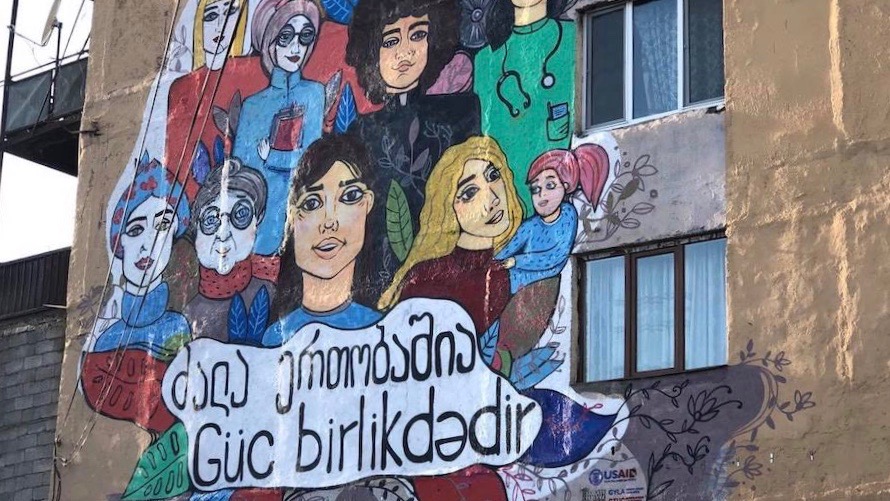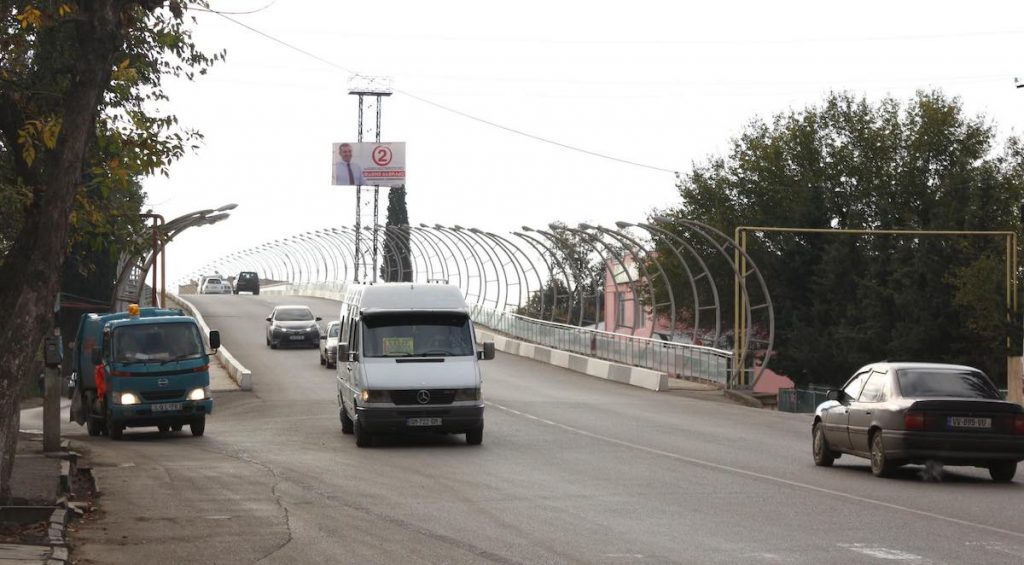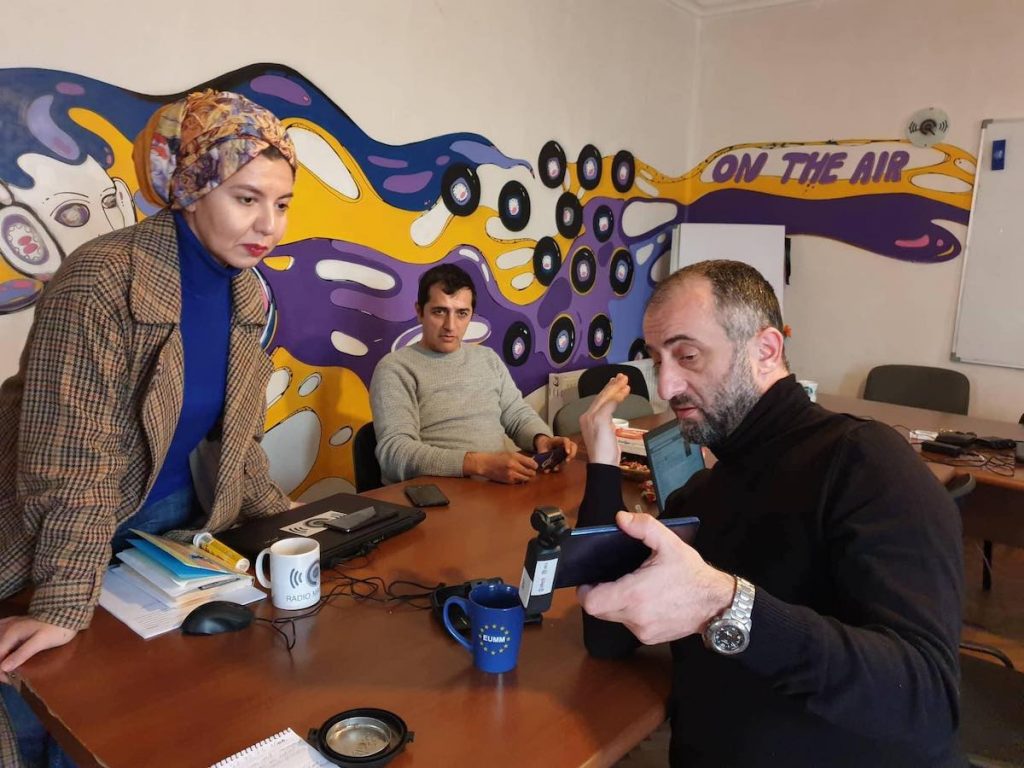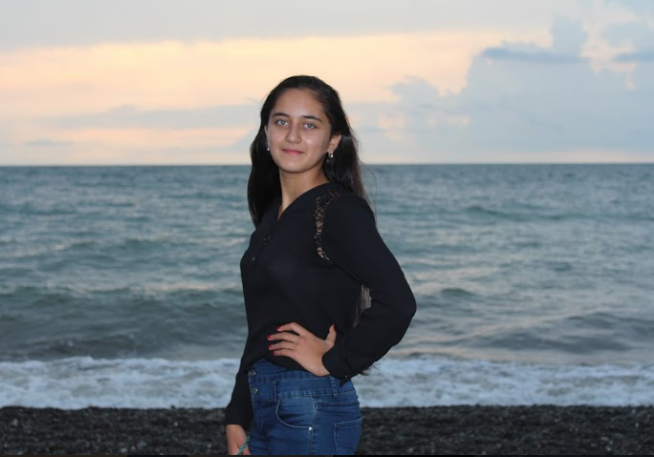Information vacuum – what are Georgian Azerbaijanis watching?
Ethnic minorities make up about one sixth of the population of Georgia.
Most of them – ethnic Armenians and Azerbaijanis – live in the south of the country in the regions of Samtskhe-Javakheti and Kvemo Kartli.
Most of them do not speak Georgian and receive information not from Georgian, but from Azerbaijani, Turkish, or Armenian and Russian sources.
Studies show that residents of Kvemo Kartli and Javakheti know better what is happening in neighboring Azerbaijan and Armenia than in their homeland, in the country where they live.
Shalala Amirjanova’s report on the problems of information dissemination in the Kvemo Kartli region.
Dinner in front of the TV
Aysel Kurbanova, 17, lives in Bolnisi municipality, in the Kvemo Kartli region.
All of Aysel’s family members leave home early in the morning – the younger ones go to school, the older family members work on the farm and are engaged in trade.
In the evening, according to tradition, everyone has dinner together, gather at the table and talk about what happened during the day.
A hot kettle is put on the table, the TV is turned on and the family listens to the news.
The voice of the Azerbaijani presenter is heard speaking on the topic of Nagorno-Karabakh. The next story is about the coronavirus. The host says that vaccination against coronavirus in the country has already begun, and this is entirely the merit of President Ilham Aliyev.
“My family is no exception. This is the case in all villages of Kvemo Kartli. People receive information through channels that broadcast in a language they understand,” says Aysel.
“They should learn Georgian”
There are 233,000 ethnic Azerbaijanis living in Georgia, which is almost seven percent of Georgia’s population.
Most of them live in the eastern part of Georgia, in the Kvemo Kartli region. Most of them do not know the state language – Georgian.

In Soviet times, communication was easy to establish in Russian – both Georgians and Azerbaijanis knew it well.
However, over the past 15 years, the Russian language has almost completely lost its position in Georgia – it is no longer a compulsory subject in schools, and young people study English.
Over the years, the Georgian government and non-governmental organizations have developed many projects for this region to change the situation.
A lot of money has been spent, but the result is not what it should be.
The programs did not work, because, as experts say, for many years the state was unable to achieve the main thing – to show the Azerbaijani population why it could be advantageous for them to study Georgian:
“These people still do not participate in the social and political life of the country and do not perceive themselves as a full-fledged part of it,” says Nino Lomjaria, Public Defender of Georgia.
Kvemo Kartli is a relatively prosperous region of Georgia. Hardworking Azerbaijanis grow vegetables, fruits and herbs here. They have a lot of cattle and sheep. The agricultural markets of Georgia are mainly supplied with products from Kvemo Kartli.
However, representatives of the ethnic minority are minimally involved in the political or public life of the country, rarely occupying leadership positions.

“Knowledge of the language is not a big problem for Azerbaijanis who have farms – they don’t need Georgian to farm and sell goods on the market,” said Kamran Afandiyev, one of the founders of the Institute for New Thinking, a local non-governmental organization.
Politicians and journalists mostly ‘remember’ ethnic minorities and their problems before the elections.
Several years ago, there was even a popular political anecdote that the Kvemo Kartli region still thought that Mikheil Saakashvili was president – he was the head of state until 2013.
The current situation is used by the authorities to their advantage, who skillfully manipulate the population in an information vacuum during each election – here the largest percentage of votes in all elections goes to the ruling party.
However, in recent years this picture has been gradually changing, our respondents in Marneuli tell us:
“The changes are obvious. Local residents have already understood that if you want to work somewhere, you have no prospects without Georgian. Therefore, older Azerbaijanis try to teach their children the Georgian language in order to enter the Georgian sector,” says Afandiyev, whose organization is working to improve the literacy level of the Azerbaijani population.
“A neighbor or child tells us the news”
“I don’t understand Georgian, we learn news from Azerbaijani television or from our children. I am glad that I sent my children to study in the Georgian sector, now they tell us what is happening in the country,” said Gulkhanum Kurbanova, Aysel’s mother.
“The villagers share news with each other. Some children will tell, some will find something on the Internet, and then we tell each other,” says 60-year-old Shaban Akhmedov from the village of Sadakhlo in Marneuli.
“I receive information on Azerbaijani television or from the Internet. I don’t understand Georgian. The children know Georgian. They read Georgian and tell us. During elections, they come to the village, meet with the population, and from there we hear about the candidates,” Gulkhanum Kurbanova said.
By law, informing ethnic minorities is the function of the Georgian Public Broadcaster.
The TV company has several programs in minority languages, but the fact is that it does not fulfill this function.
As of December 2018, only 16 percent of viewers in minority regions watched the Public Broadcaster, while it is the only Georgian channel where you can listen to news programs in Azerbaijani and Armenian.
Ethnic minorities fill the information vacuum with the hepl of foreign media, says Tamar Kintsurashvili, head of the NGO Media Development Fund:
“In Kvemo Kartli, they watch more Azerbaijani and Turkish channels, and in Samtskhe-Javakheti – Russian and Armenian. This is a big problem for the state,” says Kintsurashvili.
Fertile ground for fake news
The results of a study by the Open Society Foundations on the political participation of ethnic minorities are suggestive:
It turned out that only 13.7 percent of ethnic Azerbaijanis receive information about the events taking place in Georgia. And this is when 71.6 percent of residents follow the news from Azerbaijan every day.
In addition, according to experts, ethnic minorities who do not speak Georgian are especially vulnerable to foreign propaganda and fake news.
For example, in the spring, when the authorities closed the city of Marneuli for quarantine due to the spread of the coronavirus, the next day people took to the streets en masse – many did not know about the coronavirus at all, people wondered what it was. There were many rumors, including the artificial spread of the virus and that the quarantine was directed against ethnic Azerbaijanis.
In Javakheti and Kvemo Kartli, the non-governmental organization Media Development Fund conducted a study of the impact of foreign propaganda on the local population.
Studies have shown that narratives that are heard on Russian channels are quite common in these two regions.
For example, that the West is an enemy that interferes in the internal affairs of other countries and incites unrest, and that the West is also fighting traditional identities, instills unacceptable values and spreads viruses.
According to the poll, 60 percent of respondents believe in disinformation about Lugar’s laboratory in Tbilisi, which has been broadcast by Russian channels for many years.
Radio Marneuli
Radio Marneuli FM is one of the first local media to start broadcasting in their native language for the Azerbaijani population of the Georgian Kvemo Kartli.
The director and founder of the radio Kamila Mammadova herself is from Marneuli and is well aware of the problems with the dissemination of information in the region.
Kamila Mammadova says that responsibility for the political ignorance of the Azerbaijani population lies primarily with the state.

According to Kamila, the central media started working too late in the languages of ethnic minorities, which led to the alienation and closure of the region. Local residents already have a habit of receiving news from Russian, Azerbaijani and Turkish sources.
“Unfortunately, we cannot yet say that we are successfully overcoming bad habits and traditions, such as watching foreign television, but by raising local problems and discussing them, local media are gradually gaining their place. It is very important to develop media with the right values in the region,” Kamila says.
According to her, a big problem is how the region is covered in the central media.
For example, Kvemo Kartli, in their lens, mostly appears in a criminal chronicle – if someone was wounded, killed or kidnapped by a minor girl.
“However, in the past few years, the mainstream media have changed their approach. Information about Azerbaijanis, their identity, culture, activity is periodically covered, but this is not enough yet, ” Kamila Mammadova said.
Lost citizens
Experts believe that it is harmful for a country when its citizens are outside the information space and public discourse.
The head of CCIIR, Shalva Tabatadze, focuses on five issues.
First, the main problem, in his opinion, is that Azerbaijanis living in Georgia who do not know Georgian do not feel like citizens.
“That is, in this case, the feeling of citizenship to Georgia is often reduced,” the expert says.
Secondly, lack of knowledge of the language and information vacuum are also a serious problem in terms of values.
“This is reflected even in the attitude of different ethnic groups towards the stated goal of Georgia’s integration into NATO and the European Union,” Tabatadze said.
The third problem, according to the expert, is that Georgia is losing politically and economically thousands of people who are not fully involved in the construction of the country.
The fourth big problem, which the expert names, is low political activity and unconscious choice.
“Instead of actually exercising their right to vote, ethnic minorities have been involved in some kind of formal procedure for years because they make an unconscious choice in elections.”
According to Tabatadze, the fifth problem is that the opinion of these regions is easily influenced by disinformation:
“In the modern world, media is used not only for information, but also for disinformation, and in cases where access to balanced information is difficult, disinformation is easy to manipulate.”
“I’ll read the news for locals”
Aysel is studying in the Georgian sector of the Azerbaijani school – this year she is an applicant, preparing to enter the university.
She speaks fluent Georgian.

“I’m going to enter the Faculty of Journalism. By the way, one of the reasons I want to be a journalist is that in the future I have to tell the news to local people,” Aysel tells us, adding that she and her friends often argue with villagers who are influenced by false information.
According to him, she is grateful to her parents who sent her to the Georgian sector of the school:
“If any family in our village wants their child to be successful, they should send him to the Georgian sector.”
Kamran Afandiyev draws attention to the same trend. He says that more and more young people in Kvemo Kartli know the Georgian language.
First of all, in his opinion, this is due to the existing problems that ethnic Azerbaijanis face due to their lack of knowledge of the Georgian language:
“If we leave alone news and information about political events, even when addressing the local government, they feel discomfort, because everything is in Georgian. They can neither write nor read in Georgian. When you fill out the documents or you get sick and go to the doctor, if you do not know Georgian, this is already a disaster,” Afandiev says.
According to him, “when you do not know the state language, you feel like a guest in your homeland, and this is a big problem that all Azerbaijanis should understand.”


















